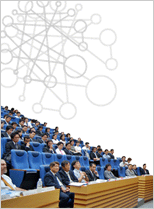WORKSHOP I: ONLINE CULTURE: FROM ANYTHING TO EVERYTHING
The
Internet has had a revolutionary impact on the computer and
communications world with cultural and socioeconomic ramifications of
an unprecedented magnitude and range. This workshop aims to analyze
this predominant cultural movement of our time - the online culture. As
can be espied by its connotations, culture, in the traditional sense,
referred to the tendencies of the elite. Movements arose whenever their
interests shifted and rippled through the remainder of the society.
With the emergence of the online culture, however, the tide has turned.
No longer is culture governed by an oligarchy but has adopted a
democratic system in which each and every participant plays an
integrated role.
Such a revolution was only possible due to
the extraordinary nature of the underlying medium. Online culture
blossomed atop the Internet, a worldwide network of computers, which
facilitates the publishing and sharing of its resources. Never before
was it easier for an individual to express his opinion to the general
public, and the location of resources and the location of the pursuers
of these resources ceased to function as obstacles. The contents of a
resource have become the primary concern among the participants, while
the significance of the publishers’ authority has diminished.
Unfortunately, such disregard of the identity of the author has
incurred legal issues with heated arguments.
As the Internet
grew from an interesting current to a tidal wave that swept through
every corner of our daily lives, past generations emerged from their
shields of denial and have begun to participate. Established scholars
of psychology and economics have conducted studies on the behavior of
individuals in a virtual environment, and politicians and legislators
are attentively listening to the voices of the online community.
Furthermore, linguists are analyzing the widespread changes in both
written and spoken forms of language brought about by the Internet.
What,
then, are the contents at the cornerstones of the online culture? How
are these contents expected to evolve? How are the legal issues being
addressed, and what are the implications of their resolutions? How are
online communities morphing the way in which ideas are shared,
represented, and voiced? With the help of specialists from respective
fields, these questions will be addressed during individual sessions of
the workshop, thereby providing a holistic understanding of the online
cultural movement, its technological foundations and its socioeconomic
significance.
DAY 1 – July 20, 2005 (KAIST campus, Daejeon, Korea)
Session #1 – Student Discussion
Instructor:
Junho Kim, Workshop Leader, Korea Advanced Institute of Science and Technology
Session #2 – Socio-Technological Tools and Resources to Counter the “Digital Divide”
In
this talk we will introduce a variety of technologies and
infrastructure resources that can help set up a highly accessible and
affordable information network that can provide suitable platforms for
social intercourse. Such technologies include both communication and
access channels, such as ubiquitous wireless access and software
overlay technologies, such as Peer-to-Peer (P2P) systems. We will
emphasize the synergy that naturally exists between the technological
concepts necessary to build large-scale information systems and human
dynamics that lead to the emergence of social networks and diversity in
societies. We will argue how such synergy can be exploited to guide
policies that can help bridge the digital divide. In particular, we
will address the challenging issues of self-governance, security, and
authenticity of information transmission in the cyberspace, and how
regulatory laws can both hamper and facilitate the emergence of online
democratic institutions and communities.
Speaker:
Vwani Roychowdhury, Professor, University of California, Los Angeles
Session #3 – History of the Internet
The
Internet started in the late-1960s as a research network, called
ARPANET, and it is becoming a global social infrastructure. This
presentation reviews the development of the Internet from the inception
of computing in the 1940s to the 2000s.
The Internet went through
its conceptual development in the 1960s, followed by its early
deployment in the 1970s. The 1980s saw its deployment in many parts of
the world, and the 1990s saw the commercialization of the Internet with
the invention of the World Wide Web. The Internet is becoming
ubiquitous in this decade, and its convergence with telecommunications
and broadcasting are being realized.
Youth played a major role
throughout the development of the Internet and created a distinctive
Internet culture. We anticipate this trend to be sustained for the
coming decades.
Speaker:
Kilnam Chon, Professor, Korea Advanced Institute of Science and Technology
DAY 2 – July 21, 2005 (KAIST campus, Daejeon, Korea)
Session #4 – From Data to its Organizing Structure
I
will discuss the use of data collection, data processing methodologies,
and data visualization presented simultaneously in interactive
installations and the Internet in two projects:
“Pockets Full of
Memories” consists of the public contributing data (an image of an
object and semantic descriptors) to a database whose data is visually
organized by the Kohonen self-organizing mapping algorithm in a 2D
dimensional map. The algorithm basically looks at all the data and
continuously organizes them in a 2D space so that every object is
surrounded by others of similar semantic attributes until order is
achieved at the local and global state.
http://www.mat.ucsb.edu/~g.legrady/glWeb/Projects/pfom2/pfom2.html
“Making
Visible the Invisible” is a commission for the new prestigious Seattle
Public Library, by the internationally renown architect Rem Koolhaas.
The project consists of analyzing and then visually mapping on a daily
basis changes in what the public is reading, tracked through the
circulation of books going in and out of the library.
http://www.mat.ucsb.edu/~g.legrady/glWeb/Projects/spl/spl.html
Speaker:
George Legardy, Professor, University of California at Santa Barbara
Session #5 – The Digital Divide
“Digital
Divide” has become a popular keyword in describing current and
foreseeable inequalities of the online era. Many political and business
leaders alike have voiced concern that in the Information Age, old
social and economic discontinuities will deepen while unequal access to
information technology will create new intra-national and international
divisions. In this session we will examine the economic, logistical,
and cultural complexities of the problem at hand. This will naturally
lead to a discussion of current and future efforts from governments,
private sector corporations, and NGOs as well as a discussion on how to
strike an appropriate balance between efforts from these different
parties.
Speaker:
Junhao Hong, Associate Professor, State University of New York at Buffalo
DAY 3 – July 22, 2005 (KAIST campus, Seoul, Korea)
Session #6 – Online Communities-A Personal Resource Planner is Coming
An
ERP is optimally sharing and spreading an enterprise’s various
resources. Personal resource planner (PRP) is optimally sharing and
spreading a person’s various resources. One’s experience (movie
appraisal, book or food review, hospital or lawyer review, reputation
information about contacts), results of activities (photo, movie,
knowledge, know-how, works), results of buyings (digital camera,
computer, car, house) are all those representing personal resource.
Versatility and numbers of those depends on person’s peculiar
circumstances, region, sex, hobby, interested and occupation. PRP is a
concept cyworld.com had used for its service architecture. But
cyworld.com is a somewhat casual service, not an indispensable one like
a cell phone. Personal Resoure Planner is not an ERP yet. Intuit’s
Quickens was once a sort of PRP software for helping to optimize
personal expense. MS Money also attacked Quicken only to fail. Outlook
of MS Office can be one of PRP software. But it needs to be developed
to be networked by many contacts and teams or organization level. But
now, the world is fighting for those kinds of markets. Skype, plaxo,
kukubox, bluetie.com, groove.net’s virtual office, Siemens’s openscape
collaboration and total communication tool..etc. The power of those
kinds of solutions or service will be super doubled by the expanding
speed of participation of social nodes (users). Personal nodes and
organizational nodes are all important in social network ,because team
member can be regarded as trusting person as general contacts like
alumni, friends, and family, even if the kind of trust is different.
(thesquare.com, Stanford’s Nexus)
Speaker:
Young Hyoung, Founder & Former CEO, Cyworld
Session #7 – Internet Economics and E-commerce Models in the Online Era
It
would be an understatement to say that the Internet has created frantic
investment and hype over the last 10 years. Some characterized it as
"Extraordinary Popular Delusions and the Madness of Crowds." Although
the honeymoon seems to be over for many e-businesses, there are no
movements to abandon the millions of web sites created.
Perhaps
stability has emerged. Firms with PE ratios in the hundreds are now at
more conventional levels. Strategies are maturing, and it seems that a
compromise between the online and physical world is likely to be
effective; the usefulness of incorporating bricks with clicks emerged
about a few years ago. Customer relationship and supply chain
management serve to handle the input and output streams, and back end
processes tie them together.
Riches have been reaped by a few firms,
but it seems that not everyone is so lucky. Several firms are
faltering, and the future is very uncertain. Many news reports describe
spectacular successes (other than stock price successes) and failures
in attempting to go on-line, and give advice to the wannabes. While
pure dot com players were faltering, many brick-and-mortar firms have
successfully harnessed the potentials of e-Business technology into
their traditional business model so that they could sharpen their
competitive advantages. In this session, we review the importance of
the Internet in Business, how it have innovated business models, and
still why doubt is till high. We will try to find some root causes of
eBusiness success so that young creative thinkers may prepare better
for more radical changes to be emerged in the future.
Speaker:
Byungtae Lee, Associate Professor, KAIST Graduate School of Management
Session
#8 – Control over Information Access, and Use: Debates over
Intellectual Property and Privacy Protection in an Online Environment
The
appropriate goals and modes of protecting intellectual property (IP)
and individual privacy are only two issues among the many arising on
the online environment, but two that have posed serious challenges for
policy makers in numerous countries. This presentation focuses on
developments in the United States, but raises questions of relevance
for different countries as we try to shape our part of online culture.
Both IP and privacy questions are about the control of information and
communication: who should control information, how it should be
exchanged and communicated, and what the terms and conditions for its
use should be. Claims about the benefits of IP protections are
examined, as are the difficulties of managing IP rights given
widespread examples of the debated and unauthorized uses of digital
content and technologies. What modes of IP claims and protections best
serve the public interest, whether in the open exchange of ideas, in
promoting advances in scientific and technology, or in economic and
social development? The differing claims about the value of individual
privacy are also explored, as are the specters of new threats to
privacy emerging from the uses of database and web tools by
governments, by corporations and firms, and by the behavior of less
organized users. What about privacy is worth protecting? Do we need to
reformulate privacy ideals? How do expectations vary from country to
country? What limits to the uses and benefits of online technologies
are we willing to make to protect and enhance privacy?
Speaker:
Stephen McDowell, Associate Professor, Florida State University
DAY 4 – July 23, 2005 (KAIST campus, Seoul, Korea)
Presentation Session
The
online culture is evolving even at this moment. Personal media, which
was not preconceived a decade ago, often threatens the original form of
the media nowadays and sometimes even introduces a new type of online
community to our daily lives. Until now, you’ve always been the user of
the culture. Yet, let’s look further. What type of online culture are
you dreaming of? In this presentation, you are to devise a completely
novel type of an internet culture, online society, and virtual games
that you, or your descendants, will enjoy in the future. Explore your
imagination!


































